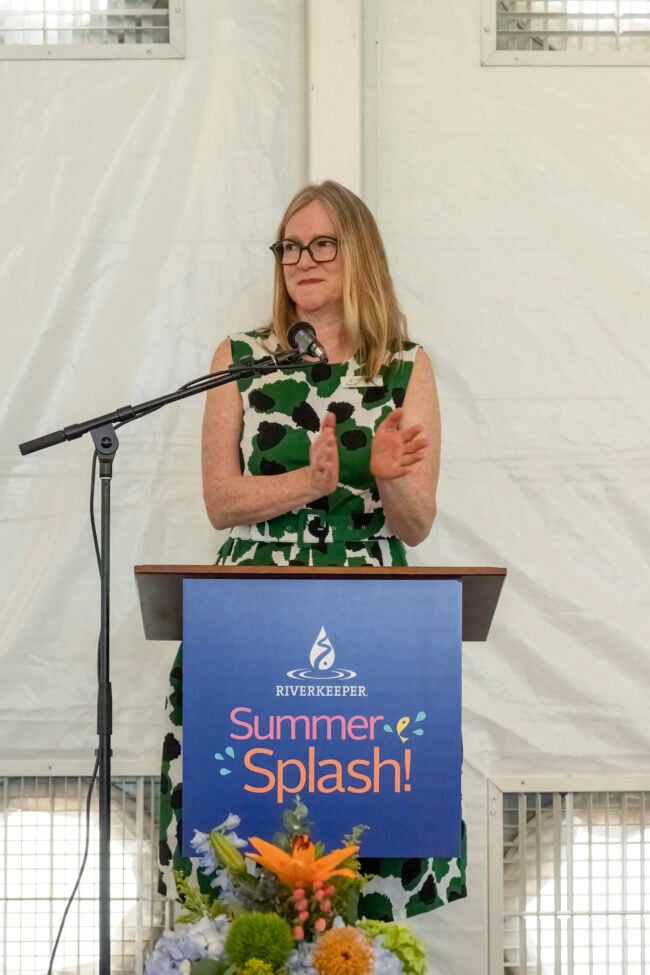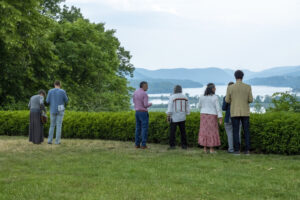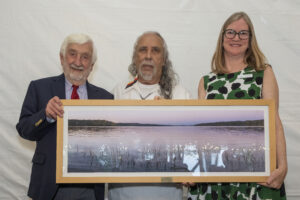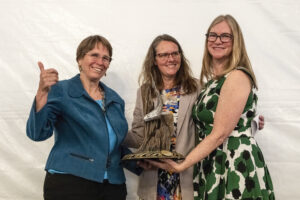Riverkeeper’s 2023 Summer Splash honors two devoted Hudson River champions

View more images on our Flickr site
Our annual celebration recognized the achievements of Fran Dunwell, founding coordinator of the DEC’s Hudson River Estuary Program, and Dr. David O. Carpenter, renowned expert on the health effects of PCBs
More than 270 friends and supporters came together for our Summer Splash gala overlooking the Hudson River at Boscobel House and Gardens on June 8, 2023, to celebrate the Hudson and honor two individuals for their decades of devotion to restoring the river.
Riverkeeper was proud to recognize the achievements of Fran Dunwell, the recently retired Hudson River Estuary Coordinator at the New York State Department of Environmental Conservation, and renowned PCBs expert Dr. David Carpenter, Director of the Institute for Health and the Environment at the University at Albany, SUNY. While enjoying music, conversation, dinner in the Pavilion, and a range of art and adventures up for auction, the guests came together in support of a shared mission for the Hudson.
 Our second annual Summer Splash brought us to the beautiful Boscobel lawn as the skies were clearing from plumes of smoke that had shrouded the region for days – the result of intense forest fires in Canada. That inescapable reminder of weather extremes, and climate change, became a theme of conversation about the challenges ahead.
Our second annual Summer Splash brought us to the beautiful Boscobel lawn as the skies were clearing from plumes of smoke that had shrouded the region for days – the result of intense forest fires in Canada. That inescapable reminder of weather extremes, and climate change, became a theme of conversation about the challenges ahead.
Tracy Brown, President and Hudson Riverkeeper, noted the climate stresses that were affecting the Hudson, its wildlife, and its communities, while celebrating the spirit that Riverkeeper has brought to its mission for more than five decades – and will continue in the years to come.
Riverkeeper finds innovative ways to push back against business-as-usual thinking, she said, whether it’s the filling of wetlands, the dumping of radioactive wastewater into the Hudson, or the capture of massive amounts of pregnant fish making their way up this estuary to renew their populations and sustain life along the coast. Brown noted examples of current Riverkeeper efforts, including the new movement to take down obsolete dams and revive habitat in Hudson Valley streams, the push for higher water quality standards in urban waters, the protection of streams that are vital to clean drinking water, and the accomplishments of thousands of Riverkeeper Sweep volunteers who picked up 31 tons of marine debris along the shorelines on May 6.
“If there’s no tool, we make the tool,” she said. “We are all about the next thing.”
‘Hudson Hero’
While guests enjoyed the stunning views of the Hudson from the Highlands, Carpenter quickly put some of the unseen problems in perspective.
“We’re at this wonderful place,” he told the group, “looking out at this beautiful hazardous waste site, which has not yet been cleaned up.”
Carpenter, a public health physician, is a leading expert on the impact of PCBs on human health. His research has explored environmental causes of human disease, and he has more than 450 peer-reviewed scientific publications. Riverkeeper honored him with the “Hudson Hero” award, presented by Chief Dwaine Perry of the Ramapough Lunaape Nation. Chief Perry said the work of researchers like Carpenter are critical to communities like his own, where people are facing the health consequences inflicted by the dumping of thousands of tons of toxic paint sludge and other pollutants, and where the EPA has found contaminants such as lead, arsenic, benzene, and PCBs.
 One area of Carpenter’s research, with implications for people living near the Hudson, has examined rates of diseases among people who live near hazardous waste sites with toxic PCBs. The Hudson remains one of the largest Superfund sites in the nation due to the dumping of PCBs by General Electric into the Hudson over the course of decades, and are still found at dangerous levels in sediment, water, and wildlife throughout the Hudson River ecosystem as far south as New York Harbor.
One area of Carpenter’s research, with implications for people living near the Hudson, has examined rates of diseases among people who live near hazardous waste sites with toxic PCBs. The Hudson remains one of the largest Superfund sites in the nation due to the dumping of PCBs by General Electric into the Hudson over the course of decades, and are still found at dangerous levels in sediment, water, and wildlife throughout the Hudson River ecosystem as far south as New York Harbor.
Carpenter’s research found elevated rates of hospitalization for diabetes and high blood pressure in areas on either side of the Hudson, despite healthier lifestyles in these populations. Other studies have seen links between PCBs in the body and the risk of those diseases. He described how lower chlorinated, more toxic PCBs can come off in the air and be inhaled – a potential means of human exposure to the chemicals, in addition to the more widely known risks from eating fish contaminated with PCBs.
“We have got to get rid of these things,” he said. “We have not solved the problem of PCB health effects. We have a long way to go yet. But thanks to organizations like Riverkeeper and Clearwater and all the others you’ve heard about tonight, we’re making real progress. But the battle is not won.”
Carpenter noted recent efforts by the Monsanto company to discredit him, which led to temporary restrictions from the university on his activities. “Thanks to the efforts of Rebecca Martin and Judith Enck, and the whole staff of Riverkeeper and a whole host of other advocacy groups, that’s all past.”
“I want to thank from the bottom of my heart the efforts of Riverkeeper over these many, many years to protect our water supply,” he said. “Not just the Hudson, but rivers and streams and wetlands and waters everywhere.”
‘Big Fish’
Our annual Big Fish award was presented by Heather Gierloff, Hudson River Programs Supervisor and Estuary Coordinator for the New York State DEC, to Fran Dunwell, who became DEC’s first Hudson River Estuary Coordinator in 1984 and developed this vital and influential program over the last four decades, retiring in 2022.
Dunwell described how local activist groups, Riverkeeper in particular, launched the effort that created the Estuary Program. In 1965, Robert H. Boyle, Riverkeeper’s founder, testified against a giant hydroelectric facility planned for Storm King Mountain in what would become an 18-year battle to defeat the project. He called attention to a study showing that the area was a critical spawning ground for Atlantic Coast striped bass, and that the Hudson was an estuary, driven by tides.
 The Hudson River Fishermen’s Association, Riverkeeper’s predecessor, together with Scenic Hudson, Clearwater, and elected officials, pressed for a new approach to managing the Hudson that recognized the estuary as a unique ecological resource, and studied its ecosystems through an interdisciplinary approach. DEC has embraced this approach and replicated it for other bodies of water, she said.
The Hudson River Fishermen’s Association, Riverkeeper’s predecessor, together with Scenic Hudson, Clearwater, and elected officials, pressed for a new approach to managing the Hudson that recognized the estuary as a unique ecological resource, and studied its ecosystems through an interdisciplinary approach. DEC has embraced this approach and replicated it for other bodies of water, she said.
The Hudson River Estuary Program envisioned a river that was clean enough to swim in and abundant with fish that were safe to eat. Dunwell described many successes that followed – efforts to retain migratory fish populations that were on verge of collapse, restore habitats, address sewage pollution, and provide “swimmable” water quality. Armies of local committees built upon that work, providing natural resource inventories in communities throughout the Hudson Valley, for example.
The work of the Estuary Program continues, with grant programs to identify dams that are blocking the movement of migratory fish, and the the new $4.2 billion Environmental Bond Act, setting aside funds for habitat restoration, clean water infrastructure and much more.
Signaling the challenges ahead, Dunwell noted the need for measures to prevent invasive species from getting into the Hudson via the Erie Canal.
“I just hope you keep up the fight, and never stop fighting,” she said, “because the challenges are ever changing. The job is never done.”
Learn more
Fran Dunwell: The river can be a unifying force
Dr. David O. Carpenter: Science for the people
Get involved
Summer Splash is our annual fundraiser that helps make our work to protect and restore the Hudson River and its connected waters. You can support this work all year long by becoming a member with a one-time or monthly gift or volunteering for Riverkeeper. To stay informed about news and events happening near you, please join our mailing list.
Photos by Cynthia Grabau Photography

